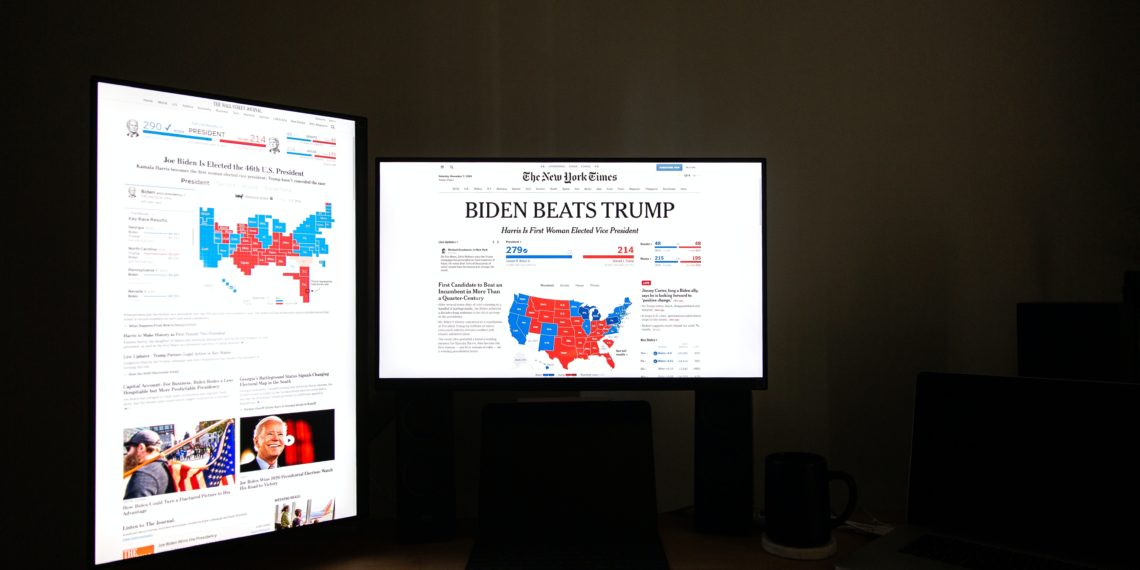Much like America, my household is deeply divided. Since mid-March, I have been living with my mom, dad, and my grandfather. Between the four of us, we cover pretty much the entire spectrum of American politics. While my mom and I are further left than most elected Democrats, my dad hovers somewhere between Democrat and Republican, choosing to exist in the oxymoronic but popular “socially liberal, and fiscally conservative” category. My grandfather, on the other hand, is fully committed to the “Trump Train,” and listens nearly nonstop to Rush Limbaugh and Fox News. While these deep internal divisions in my family have existed for a few years now, the weeks leading up to the election were fraught with even more tension than usual.
My parents and I voted by mail a few weeks ahead of the election. My grandfather scoffed at the idea of mail-in ballots and vehemently rejected us when we offered to procure him one through the Secretary of State’s online system. He confidently stated that he would be voting in person on Election Day, with the heavy implication that this somehow made his vote more worthwhile than ours. Like many of our disagreements in the past, we ignored him and did not rise to the bait, as we knew he was merely parroting the damaging rhetoric that Fox News and Limbaugh like to spread.
My parents and I sat down at the dining room table, read the instructions carefully, and discussed the candidates as we filled out our ballots (Anm. d. Redaktion: in den USA werden bei den Präsidentschaftswahlen auch gleichzeitig die Hälfte der Senatoren gewählt). Though we all voted for all of the Democratic candidates, we were not particularly hopeful that any of them would win. Living in Kentucky, a reliably Republican state which has elected Senate Majority Leader Mitch McConnell for longer than I’ve been alive, we are used to our votes not really impacting most elections, but particularly those at a federal level. We knew that Kentucky would go for Trump and the election would come down to just a handful of states as the candidates fought for electoral votes. We nervously wondered what would happen in Pennsylvania, Georgia, Arizona, Michigan, Ohio, and Wisconsin. I scrolled through Twitter for hours reading different perspectives on the election. We watched interviews with voters in Arizona who were planning to vote for a Democrat for the first time in their lives. We watched interviews with Black voters in Ohio, who burst out laughing when asked if they had ever considered voting for Trump. But we also saw our very own friends and family speak loudly and proudly about their intentions to re-elect Trump. It seemed that both sides felt completely confident that they would win. Of course, this meant that one side was in for a deep and painful disappointment. Unlike many people, however, we were not confident at all in our predictions. While we were nervously optimistic for a Biden win, we suspected that it would be a hard-fought victory, not the easy landslide that some political commentators and pollsters predicted.
Election day turned into election week, holding the country in suspense
Unfortunately, we were mostly correct. While Biden is currently leading by over six million votes, the election results won’t be certified until early December when the electors from each state cast their votes. Thanks to a flood of mail-in ballots, elections results could not be accurately projected on election night, like they have been for years. Rules regarding the counting of mail-in ballots differ from state to state so while some states, such as Florida, were allowed to open and count mail-in ballots as they arrived and thus had nearly complete results by midnight on November 3rd, other states, such as Nevada, did not have complete results for days because they were not allowed to count mail-in ballots until polls closed on Election Day. To make matter worse, in many of the most crucial states, including Arizona, Pennsylvania, and Georgia, election officials’ efforts to swiftly and effectively count every vote were hampered by restrictions put in place by Republican state legislatures. The lag in elections results in these states, almost entirely due to huge backlogs of mail-in ballots, meant that on election night Trump jumped out to a large lead, thanks to in-person voting, that was slowly chipped away over the next few days as mail-in ballots, which were overwhelmingly for Biden, were tallied.
This led to a painful and drawn-out week of waiting for election results. I watched more cable news that week than I have all year. The difference in election coverage between news networks was jarring. As Steve Kornacki of MSNBC frantically calculated what needed to happen is specific counties in Pennsylvania for each candidate to win the state, Tucker Carlson of Fox News offered confusing and unsubstantiated claims of voter fraud. As the week continued on, and Trump’s chances of winning dwindled, the cries of voter fraud from Republicans grew louder and more desperate, culminating with Rudy Giuliani’s press conference at the Four Seasons Total Landscaping in Philadelphia, a few hours after the election was called for Biden. By the time of Giuliani’s press conference, I had spent several joyful hours texting with friends and imagining a country not run by a narcissistic and evil man. Sandwiched between a sex shop and a mortuary, Giuliani’s press conference was the epitome of Trump’s failure of a presidency. The stress of the previous days evaporated, and though I knew Trump would inevitably challenge the results in court, it felt like I could let go of the breath I had been holding for four years. While many of Trump’s policies had not impacted me directly, the constant degradation of women, along with the overt racism, homophobia, and transphobia that formed the base of many of his policies infuriated me on a daily basis. The denial of climate change and the stripping of protections on some of America’s most unique biomes, such as the Tongass National Forest, will have devastating implications. The failure to manage the nation’s response to the COVID-19 pandemic and the repeated denials of basic science has had, and will continue to have, a deadly impact. Voting Trump out of office is the first step to righting these wrongs.
Biden’s Presidency wouldn’t mean an instant fix to current problems
As Trump’s misguided and unsubstantiated legal challenges continue to fail in spectacular fashion, and Biden’s inauguration draws closer, I, along with most of the country have turned towards the future. While I know that Joe Biden is not exactly a savior for our country and I do not agree with all of his policies, he is undoubtedly better than Trump. There are a number of things Biden can do on his first day in office to combat the impacts of Trump’s time in office. He can rejoin the Paris Climate Accords and the WHO. He can end the ban of immigration from majority-Muslim countries and stop the policy of family separation at the U.S.-Mexico border. He can institute a national mask-mandate and follow the recommendations of leading epidemiologists and scientists about how to deal with the pandemic. These are all fundamentally good and necessary things. However, the most pressing problem is that at least 73 million of my fellow Americans do not agree with these things. These 73 million people believe that four more years of Trump and his policies would be the best thing for our country. Biden either has to figure out how to govern a country that is fundamentally and deeply divided or hope that Democrats can win the Senate so that Republicans can be legislatively steamrolled in the same manner that Trump has done to Democrats for the past four years.
While Biden’s election has reassured me that when it comes to short-term issues and fixes, I, along with many young Americans, remain extremely nervous about the future of our country. The issues that Biden has the short-term ability to fix are merely symptoms of the deeper problems that plague America. The systemic racism that is written into the founding documents of America led to Trump’s immigration policies and his repeated and violent condemnations of racial justice protests throughout the summer and fall. America’s dangerous obsession with capitalism, disguised as individualism and personal responsibility, is directly responsible for the student debt crisis and the money-grubbing and ineffectual healthcare system. The rise of evangelic Christianity, almost exclusively within the Republican Party, means that violently homophobic and transphobic people continue to be elected across the country, and particularly in the South. Abortion rights continue to be attacked, as Republicans claim that abortion is murder, but then crowdfund money to bail out Kyle Rittenhouse, a white 17 year-old who killed three people at a racial justice protest in Wisconsin. Biden might be able to right the ship and keep us from sinking right now, but I am not confident in his abilities to dramatically change course and deviate from the path that America has been on since it was founded.
While I hope the future will be better, I am not sure that it will be. I worry that America is too deeply divided to ever work towards any meaningful and positive change. There are many good and caring people in this country and they have had, and will continue to have an impact. Most of the changes that America desperately needs are not impossible, but they will require massive amounts of work. This election cycle had many positives, including a record number of trans and non-binary people elected to both state and federal positions, the first two gay Black men to serve in Congress, and a record-breaking number of Native Americans elected to Congress. Kamala Harris, being an Asian-American and an African-American woman, is breaking new ground for a number of marginalized groups. My hope for the future is much like my hope for this election. Things can be fixed, but it will not be easy.
Von Emily Crowe








